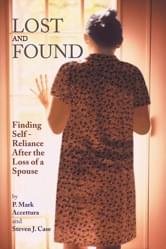Finding Self-Reliance after the loss of a spouse
The book is designed to assist surviving spouses, those planning for the eventual loss of a spouse and the families of surviving spouses in the grieving process and in navigating the complex legal, governmental, financial and accounting requirements associated with the death of a loved one.

Introduction
Death changes everything, especially when it’s the death of your spouse. You may experience confusion, doubt, fear, abandonment, insecurity, anger, sorrow and a host of other feelings. The ground is shaking and everything seems to be in flux, including your finances, your social life and even your own health.
Suddenly there is no plan or pattern in place. All of your images of the past are displaced by the fuzzy realization that fate has dealt you a blow that has changed your life. Waves of strong emotion threaten to engulf your ability to think, make decisions and properly care for yourself. Strong, even overpowering emotions are a normal and expected consequence of your loss. Once you come to accept that your primary source of love, happiness and security is gone, the grieving process can begin. We are much more knowledgeable about physical injuries than injuries of the spirit. If we have a physical injury like a cut, we bleed, and a scab forms over the wound. We protect the area from infection by keeping it clean and shielding it from re-injury. The scab may break open delaying the healing process, but eventually the tenderness lessens, the wound heals and normal function returns. We know with time our cut will heal and we will be restored to health.
The same healing principles apply to injuries of the spirit. Losing a spouse can be an emotional assault that hurts deeply. If you’re scared, confused and hurting, you are not crazy. You would not be human if you were not struggling to cope. Your emotional and physical reactions are part of the normal grieving process that follows a profound loss.
Grieving is a normal process that contributes to emotional healing. With time, your wounds will mend and your life, though changed, will continue. It is important that you not deny your grief, but feel it fully. Enlist the help of those around you. Don’t be alone. As Thomas Lynch says in “Tract,” reproduced in Chapter Thirteen, “The only way around these things is through them.”
The stories of the surviving spouses that we share in this chapter illustrate how people react differently to the loss of a spouse and how their reactions can contribute to, or hinder the healing process. We will make specific recommendations to help you on your journey of healing and discovery. Those of us who have made this journey can attest to the fact that there is hope, and you will again experience joy.
The death of a spouse propels us on a difficult journey that is unique to each. During life, we experience many kinds of loss. Some are small and relatively easy to bear, like losing a favorite piece of jewelry or misplacing your driver’s license. Others cause us to question our abilities and our self-worth, like the loss of a job or the failure of a business. Some force us to accept that life changes, such as when our children leave for college or when we divorce. Loss is a part of life.
Because you share so much of your life with your spouse, it is only natural that his or her death shakes you to the core. Together, you may have raised a family, laughed, cried and celebrated every special event you can remember. You may have been married so long that the time before you were married seems like someone else’s life. You expect your spouse to be at your side. Losing your spouse is like losing a part of you.
You may feel buffeted about and may lose confidence in yourself. You may feel confused, unable to make even minor decisions or feel as though you lack the strength to carry on. Many widows and widowers alike find it difficult to make important decisions without the advice or direction of their spouse. As a result, they often fail to make time sensitive decisions.
To complicate matters, you may not know how to act while grieving. We learn how to behave in school, at the movies and work, but not how to act while grieving. You may worry that friends and family will think you are not grieving enough, trapping yourself in the grieving stage just to prove your love for your spouse. Healing and moving on with your life neither proves nor disproves your love for your spouse. Being “okay” simply means that you choose to live in spite of fate’s blow. It is your right to be happy, live your life and even remarry. Some survivors emerge from their late spouse’s shadow to resume a career, become a family leader or a public crusader.